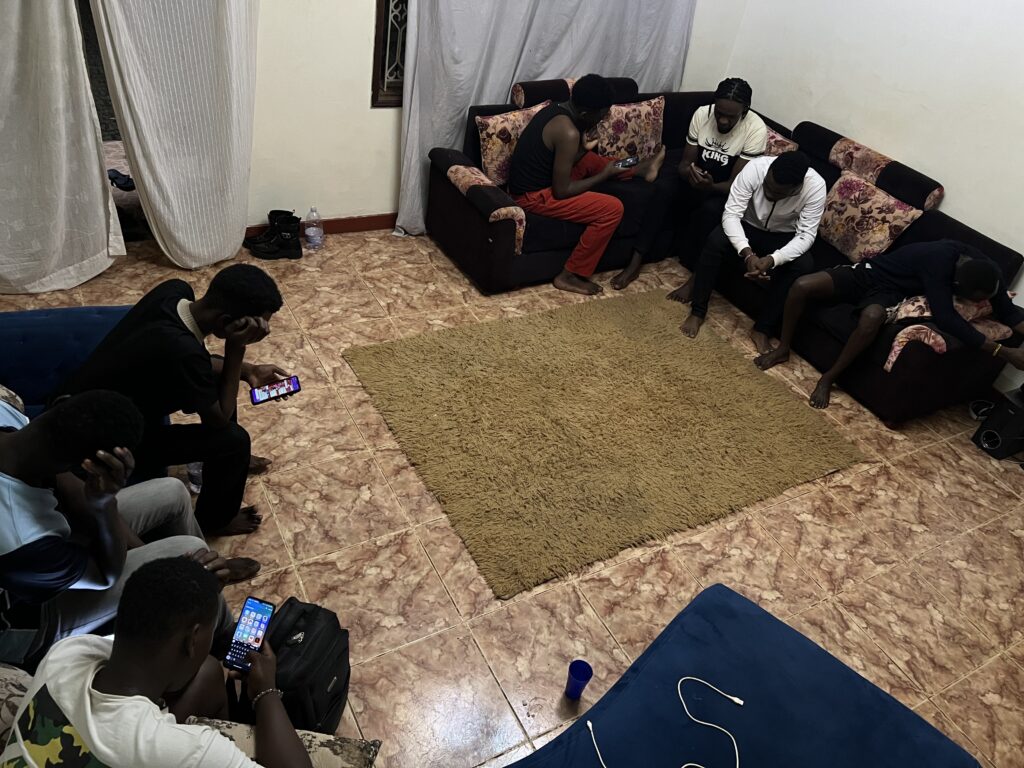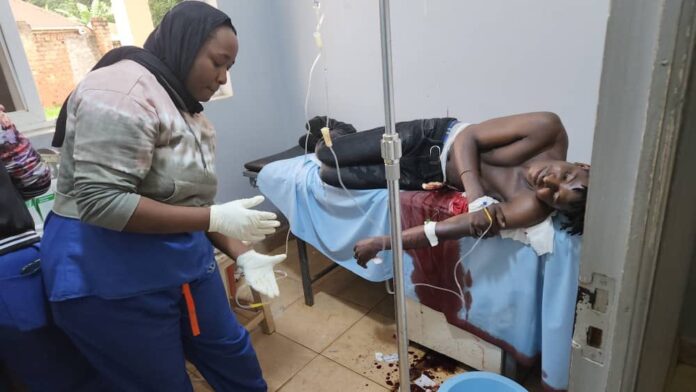“My family abandoned me in 2019, and I had nowhere to go,” said Benjamin Wejuri, a gay Ugandan activist. After he was rejected by his family for being gay, Wejuri aimed to help others faced with similar circumstances. In 2020, he launched House of Hope — a shelter that offers temporary housing, mental health support and skills training to trans women.
Queer people are isolated and outcasted in Uganda, where anti-LGBTQ+ rhetoric inspires hate. Despite Uganda’s rich history of open LGBTQ+ expression and leadership before the country was colonized, persecution began when penal codes were introduced during British rule — and in recent years, discrimination has intensified due to efforts led by American evangelical groups.
“You have to learn to live life without your family,” said Gabbie Kalungi, a trans woman who is the executive director and administrator at the shelter. “So what we do is we become their family.”
“We also teach them to stand on their own — so by the time they leave the shelter, they can take on challenges, take care of themselves, keep themselves safer,” she said.
Kalungi teaches residents to sing, which she hopes they use as a coping tool. The group often gathers to dance, craft, and play games to pass the time. Although some allied counselors offer professional support whenever possible, sessions are sporadic and infrequent — so those staying at the shelter often take care of each other and spend intentional time listening to each other’s stories.
“We call it House of Hope because everyone comes here with loss of hope, with a lot of trauma in their heads,” she explained. “We want to help them stabilize mentally so they can think of life as beyond what has happened in the past.”
Violence and danger are escalating
It’s not just a lack of shelter and community that cause concern. In 2021, police raided House of Hope, arresting Wejuri and the occupants of the shelter. They were imprisoned for a full month before a human rights organization was able to secure their release. While jailed, they were separated from the general population, forced to work in hard labor conditions, and slept in small, dirty rooms.
“We got beaten in the morning and in the evening almost every day,” Wejuri added.
Two years later — in March 2023, Uganda’s parliament passed the Anti-Homosexuality Act (AHA), which uses both specific and vague definitions of queerness to expand previous laws that criminalize people and experiences perceived to be LGBTQ+. Those convicted are subjected to harsh sentences, including potential life imprisonment and the death penalty. Additional broad language also makes the “promotion of homosexuality” a crime and requires citizens to report suspected violations, punishing those perceived to be allies.
A report compiled by Ugandan activists with Convening for Equality outlines the difficulties LGBTQ+ people encountered from January through August 2023. The report counted 176 violations of the right to be free from “torture, cruel, inhuman, and degrading treatment and punishment.” These violations include forced anal examinations, physical and sexual abuse, verbal abuse, online harassment, threats and more.
Although the state is perpetrating and participating in violence, non-state actors — including landlords, family members, doctors and health care providers, and vigilantes — are also frequent offenders.
Many of the people seeking respite at House of Hope have been brutally attacked by mobs on their way to markets or when returning home. Incidents have been increasing and since October 2023 have occurred at a monthly rate. Activists are especially at risk, but even those who keep a low profile have been targeted.
Steven Kabuye, the executive director of Coloured Voice — an LGBTQ+ advocacy group, is one of the most recent victims. Two assailants on a motorbike confronted Kabuye around 8 a.m. on Jan. 3 — cornering him then chasing him during a violent attack.
Kabuye started recording himself after the event as he laid on the ground crying. He rested his right hand on his neck, showing a deep laceration that sliced from his elbow to just below the watch on his wrist. A knife still remained in his abdomen, which bled through his white T-shirt. He appears to say, “I’m dying,” through sobs.
Kabuye is now recovering following surgery. The attackers, who wore helmets and therefore could not be identified, did not take any of Kabuye’s property before speeding away. This points to a likely hate crime, as Kabuye had been receiving death threats.

Queer Ugandans lack access to their most basic needs
Violence looms as the waitlist for House of Hope climbs. Just 10 trans women currently reside at the shelter despite its capacity to house 25. Kalungi explained that it takes just $70 to $120 per month to financially support one resident, but a lack of funding causes the shelter to turn people away.
Residents sleep atop thin mats on concrete floors in otherwise sparse bedrooms. Most arrive with very few personal items, and many don’t have gender-affirming clothing. The house is mostly bare. Multiple bedrooms and a dining room lack any furniture. There isn’t enough food to go around.
Convening for Equality’s report documented 180 cases of evictions, displacements or banishments. Housing instability follows the shelter, which has been forced to relocate three times in its three years of operation due to anti-queer discrimination.
After one eviction from a previous property, the shelter couldn’t afford to build another chicken coop at their new location. In the past, residents learned to raise chickens, farm vegetables and bake goods both to sell and use for their own survival. Rent, food and supplies have become less accessible — and job training has been suspended — due to a lack of these resources.
“We find places that have a very low population — that the neighbors are not too close and that the area is not too busy,” said Kalungi. But the moves bring uncertainty. High walls that enclose the garden at their current location have helped protect privacy, but shelter residents still endure verbal harassment from neighbors whenever they go outside.
“We keep on having these challenges,” he added, “but we are not giving up because these people have nowhere else to be.”
Due to security risks and expenses, Kalungi and other trans women at the shelter have been forced to pause hormone therapies. She and Wejuri help members find queer-affirming hospitals and clinics when they need general medications, PrEP and HIV treatment — but trans-affirming care is often too risky to seek.
The pair hopes to use a detached building on their current property to open a drop-in center for non-emergency medical needs — such as pain medication — to reduce the need to go into public or find a supportive pharmacist.
Wejuri underlined that it’s hard to make tangible plans for their residents without more consistent access to funds. “We are just using support from well-wishers,” he explained.
An urgent call for financial help
Philadelphia activist David Fair connected with Wejuri on social media four years ago. He recently organized a GoFundMe with hopes of raising $5,000 for the shelter (through Happy Life Youth Empowerment Center, the shelter’s umbrella organization) — but as of Jan. 10, the effort has only generated $130.
He urges the international LGBTQ+ community to offer what they can so that these marginalized people can survive.
“When I was growing up, it wasn’t easy to be openly gay in the United States, but even those risks were so much less threatening than what they’re facing with legislation,” Fair said. “I’ve never faced anything like what they’re facing, and I’ve never needed to have the courage that they have.”


